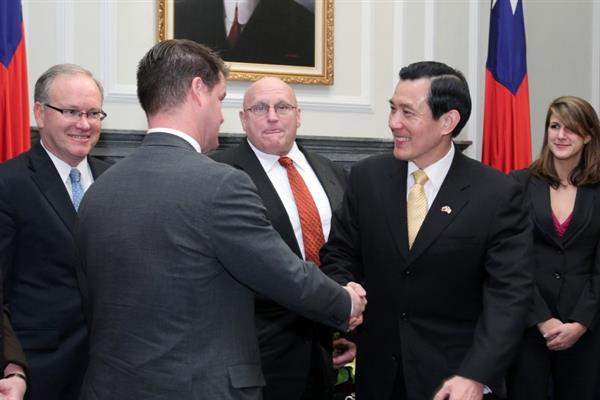News & activities
 News releases
News releases
President Ma Ying-jeou on the morning of March 29 met with former US Deputy Secretary of State Richard L. Armitage and a delegation from the Project 2049 Institute. The president and the visitors exchanged opinions on a broad range of issues related to the state of US-Taiwan relations and developments in cross-strait ties.
President Ma remarked that Mr. Armitage, as a senior US foreign policy official, made significant contributions to relations between Taiwan and the United States and to peace in the Asia-Pacific region during his tenure as deputy secretary of state. The president noted that he met with Mr. Armitage five years ago when the latter visited Taiwan, and Mr. Armitage helped arrange a very successful videoconference two years ago in which the president spoke with Mr. Armitage and experts from the Washington-based Center for Strategic and International Studies.
Regarding his efforts to improve cross-strait relations since taking office in May 2008, President Ma said his purpose is to promote peace and prosperity on both sides of the Taiwan Strait, and added that he advocates maintaining the status quo of "no unification, no independence, and no use of force" under the framework of the ROC Constitution. In addition, he said that the "one China, respective interpretations" consensus reached between the two sides in 1992 also serves as a basis for the conduct of cross-strait relations. President Ma noted that over 80% of the Taiwan public supports the policy of maintaining the status quo, so the government's stance reflects the mainstream opinion of the people of Taiwan.
With regard to ties with mainland China, the president stressed that government policy is to address "easy matters before difficult ones," "urgent matters before non-urgent ones," and "economic matters before political ones." With this approach, the pace of developments in cross-strait ties has been "neither fast nor slow," he said, and most people feel the pace is appropriate. Therefore, the government has no intention of either speeding up or slowing down.
President Ma remarked that former US President George W. Bush and current President Barack Obama both expressed support for continued expansion of cross-strait ties, and the ROC deeply appreciates that both presidents agreed to sell Taiwan defensive arms. Since 2005, the cross-strait military balance has tipped in mainland China's favor, he noted, adding that the ROC has no intention of engaging in an arms race with mainland China. Rather, we hope to maintain peace in the Taiwan Strait, and to have the defensive capability to maintain peace, the ROC needs to continue buying defensive weapons from the United States, such as the F16 C/D series fighter jets.
President Ma also commented that the ROC seeks only to purchase defensive arms from the United States, and that Taiwan does not have the ability to manufacture these items on its own. Most purchases, he said, are to replace old equipment with more modern items and afford the ROC military a deterrent capability to fend off external threats. The government must provide a sense of security to the public, the president remarked, adding that greater confidence among the people here provides a climate that facilitates continued negotiations with mainland China.
Turning to Taiwan-US relations, the president pointed out that he was pleased by President Obama's public reiteration of support for the Taiwan Relations Act during a meeting with his mainland Chinese counterpart in January. President Ma stated that trust between the United States and Taiwan has been re-established in recent years at the highest levels, and that communications are strong. The ROC's Ministry of Foreign Affairs and National Security Council are in close contact with American officials stationed in Taiwan, which helps the US understand the latest developments here, including the status of talks between Taiwan and mainland China, he said.
President Ma called for progress toward Taiwan's inclusion in the US Visa Waiver Program, the signing of an extradition agreement, and further talks under the Trade and Investment Framework Agreement. The president noted that the ROC has successfully cut the US visa rejection rate for ROC nationals to below 3%, and that a pilot program has been launched that requires locals to apply for passports in person. These steps have been taken to further comply with specifications laid out by the US Department of Homeland Security, he said.
President Ma stated that Taiwan and mainland China have thus far signed 15 agreements and that Taiwan hopes to further sign an investment guarantee agreement and a dispute resolution agreement this year to protect the investments of Taiwan companies in mainland China and to enable both sides to effectively resolve disputes arising from these investments. In addition, the president said that Japan's recent nuclear accident has increased the level of concern in Taiwan about the safety of nuclear power plants on both sides of the Taiwan Strait. President Ma pointed out that six nuclear power plants operate over 10 generating units in mainland China near the Taiwan Strait, and mainland China plans to build 27 more nuclear power facilities throughout the country. Japan's Fukushima nuclear power plant is about 2,000 kilometers from Taiwan, while all of Taiwan falls within 200 kilometers of mainland China, meaning that a nuclear accident on either side would have an enormous impact on the other. Consequently, we are strengthening the safety of the six units at the three existing nuclear power plants in Taiwan and hope to cooperate with mainland China to prevent nuclear accidents. President Ma stressed that nuclear safety will become an important topic in future talks between the two sides.
The visitors were accompanied to the Presidential Office by Deputy Foreign Minister Lyushun Shen to meet President Ma. Also attending the meeting was National Security Council Secretary-General Hu Wei-jen.



